HIT CHANNEL EXCLUSIVE INTERVIEW: January 2025. We had the great honor to talk with one of the greatest guitarists of all time: Larry Carlton. He is most well-known for his studio work for Steely Dan and Joni Mitchell. He has been a member of The Crusaders and Fourplay and has also played with Michael Jackson, John Lennon, Steve Lukather, Lee Ritenour, Robben Ford, Barbra Streisand, Joan Baez and many others. In addition, he has an acclaimed solo career and has won 4 Grammy Awards. In 2021, he released “Soul Searchin’” album in collaboration with Paul Brown. Sire has launched the very successful Larry Carlton signature guitar series, as well. Read below the very interesting things he told us:
What are the projects you are currently involved with?
None. I’m semi-retired, I just do 20-24, something like that, concerts a year and that’s it.
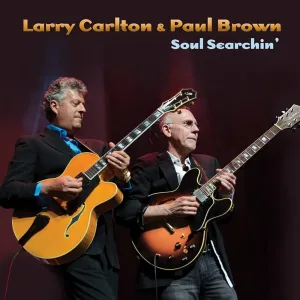 How did you come up with the idea to make “Soul Searchin’” (2021) album with Paul Brown (guitar)?
How did you come up with the idea to make “Soul Searchin’” (2021) album with Paul Brown (guitar)?
Paul and I are friends and he produced a couple of my very successful smooth jazz albums years ago. He approached me and it had been many years since I had done a project for what we call “smooth jazz radio” in the States, so, I thought it would have been cool and Paul did all of the “heavy lifting”: He produced it, he put together most of the tunes and then had me write sections for those tunes. We never worked together, I did my parts in my studio outside of Nashville and he did his parts in Los Angeles. So, that’s how it came out, just to do a project that would be friendly to radio.
Are you proud of your signature guitar series with Sire?
Thank you for asking about that. Sire approached me about five years ago, I was in Japan doing a tour and they said: “We would like to do a signature series of guitars with your name on it and our whole approach is to make high quality guitars at a very affordable price”. So, they flew out about six guitars to be with me and I was blown away. The quality of the guitars and the price point of the guitars were very exciting, so, for me, it’s a chance now at the last stages of my career to give back a little bit. Guys that want a quality instrument at an affordable price, they can do it, these are the guitars! I mean, they are just great. So, thank you for asking and I’m very proud of the Sire affiliation that I have.
There are many signature series available by Sire: H Series, G Series, L Series, T Series, J Series, X Series. Why did you decide to have so many models?
That’s the Sire way of doing it, to continue to make guitars of that quality but across the board style-wise, so, they can please many-many people. For me, as long as the quality stays the way it’s supposed to -which it has-, then I don’t care which model they make, because I can be proud to say my name is on that.
“Smiles and Smiles to Go” (from “Alone/ But Never Alone” -1986) is one your signature songs. What’s the story behind this amazing song?
I wrote that at the keyboard, I had never played it on guitar until the night of the session. So, I composed that tune at the keyboard and I did a demo with the bass line, the drum machine and keyboard and I played it for the musicians with a chart and then I told Abraham Laboriel (George Benson, Al Jarreau), the great bass player: “Give me a minute, I haven’t found my guitar part yet” and Abraham, in his wisdom, he said: “Larry, that’s your melody”. So, I doubled the piano part that I had composed, we played it a couple of times and that was it and that little tune connected with everybody around the world.
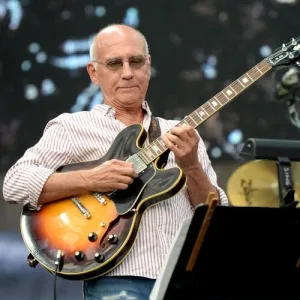 Did you have fun doing the “No Substitutions: Live In Osaka” (2001) live album with Steve Lukather (Toto -guitar)?
Did you have fun doing the “No Substitutions: Live In Osaka” (2001) live album with Steve Lukather (Toto -guitar)?
Of course, I’ve known Luke since he was -I don’t know- 18 years old… He is one of my favorite characters. He is so fun to be with and a great musician, of course. So, yes, we didn’t plan to record when we started the tour, but after the first two nights we realized how fun and spontaneous it was, so, we put together a recording truck and recorded the last night of the tour. Yeah, I’m very proud of that album and I love Steve, he’s a great guy.
Was it an interesting experience to record “Larry & Lee” (1995) album with Lee Ritenour?
Prior to doing that album, I was on MCA Records, but GRP Records -which is the label that Lee was on- bought MCA, so, I was assigned to GRP. It was GRP’s idea to have Lee and I finally do something together and yeah, the album was very successful and very musical. I enjoyed the collaboration, yes and we did some touring together which was fun and you know, we had a great band. Yes, it was a good collaboration.
How much has your approach to guitar changed over the years?
Oh, I don’t know, I have never really thought about that. It goes in cycles or seasons, maybe. You have shredders (laughs), which makes them and the audience very excited and then you have guys like me that play fewer notes but try to be more soulful, if you will. Then, there are combinations of guys who try to do both. I don’t know what to say about how it’s changed over the years, it’s just an appropriate thing; music changes over the years.
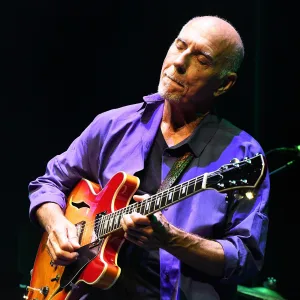 Could we say that the decision to accept the offer for “The Going Thing” commercials for Ford was a catalyst for your later career?
Could we say that the decision to accept the offer for “The Going Thing” commercials for Ford was a catalyst for your later career?
Partially, yes. Partially. “The Going Thing” group were studio singers, basically and out of the group of musicians that they hired for their live shows -we did corporate gigs for Ford-, I was the one that was most capable to play on the commercials. So, playing on those Ford commercials, I met other studio musicians and it did help get my name available to the other musicians that were doing studio work.
What’s so special about the Gibson ES-335?
I can only talk about what’s special about my Gibson 335 (laughs). I chose it out of three ES-335s that were hanging on a wall. It just sounded rich, fat and sustained and I never plugged it in to an amplifier before I bought it. I bought it strictly on the acoustic value of it. Yeah, many-many people have compared their 335s to mine when they want to buy a 335, to see if it sounds as rich as mine does. It’s just a special instrument.
Could you please tell us everything we should know about your groundbreaking solo on Steely Dan’s “Kid Charlemagne” (from “The Royal Scam” -1975)?
Oh, you know it’s funny. For me, it was just another night at the studio to do solos on a project, but in retrospect, everybody loved that solo on that tune. In my opinion, it was just the right player on the right song at the right time and I was very humbly surprised when all of the accolades came out about that solo. I did not expect it and did not plan it and I think Donald Fagen (vocals, keyboards) is the one who remembers more about that night more than I do and he said it was two takes and they put together the section. It was one take up to a certain point and we punched in and did another and we finished it from there on. I’ve made a joke, I’ve always said: “The Note Fairy was very generous that night to me”.
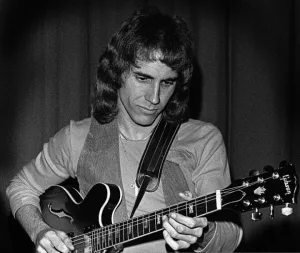 In your opinion, what makes the music you created with Steely Dan still relevant in 2025?
In your opinion, what makes the music you created with Steely Dan still relevant in 2025?
That their music was accessible to the listener, but sophisticated that -25, 35 years later and now 40-some years later, the records that I played on with them- it’s not going to sound dated. It’s going to sound like what it is: The quality that doesn’t go away with time.
Randy Brecker (Brecker Brothers, Blood Sweat & Tears, Bruce Springsteen -trumpet) told me last year that everybody who went into a Steely Dan session, knew that they would play 20 or 30 takes, so they saved the best lines for the end. Is it true?
No, from my experience. We did many takes often, but nobody was saving anything till the end, that I know of and I was on many of those tracking dates, I actually did the charts for many of those dates. Everybody was on every take, trying to get the take. So, I’ve never heard that said.
I know that you don’t have many happy memories from the sessions of “Bony Moronie” (written by Larry Williams) for John Lennon’s “Rock ‘n’ Roll” (1975) album. What really happened?
(Laughs) Yeah, many of us studio musicians and stars were called to play for John Lennon’s “Rock ‘n’ Roll” album, but if it was a 7:00pm session, John Lennon and Phil Spector (producer) didn’t show up until after 10 o’clock, so, we just sat around the studio and it was boring. Leon Russell (ed: Joe Cocker, George Harrison, Bob Dylan -keyboards, vocals) was there and I knew Leon and we just visited and killed time and then when John got there, he was drunk and the session was not fun. We only did a couple of takes on “Bony Moronie” and that was the end of it. So, I knew that that week we were booked for five nights to do this, it wasn’t going to be fun, so, I just cancelled it. I got home and called Phil Spector’s office at midnight and told them that I wasn’t available for the rest of the week.
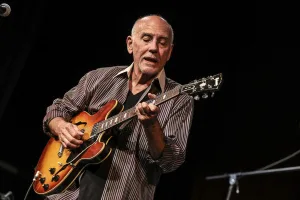 How did it happen to play on Michael Jackson’s song “She’s Out of My Life” from “Off the Wall” (1979) album?
How did it happen to play on Michael Jackson’s song “She’s Out of My Life” from “Off the Wall” (1979) album?
I had worked for Quincy Jones (producer) a number of times over the years, so, he was familiar with my style of playing and also the composer of the song “She’s Out of My Life”, Tom Bahler, Tom and I were in “The Going Thing” together, so, that’s how long we had known each other. They thought I would be the right guy to play on that tune, so, they called and said: “We have one tune and it’s got to be you, Larry”. So, I went in and I played on that one song. Michael was not there, his vocal was already done; it was just the keyboard part and Michael’s voice.
How much artistic freedom did you have on other people’s records?
A lot. It seems that after The Crusaders records where I was featured a lot, people called me and they wanted me to do my sound and my ideas on most of the records that I played on. Of course, there were a few where the parts were written out and you just played them, but usually they would want me to create my own parts.
You are a great producer, too. Who are your influences as a producer?
That’s a funny question, I only produced a few outside acts and really it was an experiment, because I was burned out as a session guy toward the end of the ‘70s and the early ‘80s, so, I put the word out that I would be producing some acts if they were available. Really, there were no influences, it was just the way I make records with whichever few artists that I did produce and I had a good time doing it.
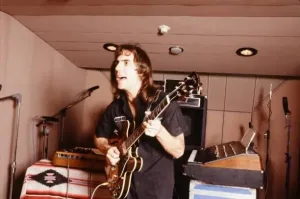 Would you like to share with us the question you once asked Louis Shelton (The Monkees -guitar)?
Would you like to share with us the question you once asked Louis Shelton (The Monkees -guitar)?
(Laughs) That was a great day. Louis Shelton, was the top studio session player in the ‘60s and into the ‘70s, of course and we were on a session together and we were friends. I was still the new guy breaking into the session scene but Louis loved the way I played and I loved the way he played, so, we were walking down Sunset Boulevard to go get lunch between recording sessions and I told him that the records that he plays on when I listen to them, his guitar is very noticeable and easy to hear and at that point my guitar was just in the background of the records I played on. I said: “Louis, how do you do that, man?” (laughs) and he had these words of wisdom, he said: “I try to think like an arranger”. Well, that was a great lightbulb moment for me: “Don’t think like a guitar player, start thinking like an arranger”. It changed my whole approach to studio playing.
Is it flattering that you have influenced great guitarists such as Steve Lukather and Adrian Belew (King Crimson, David Bowie, Frank Zappa)?
Of course, I ‘m honored that guys listen to what I play and say: “I need a piece of that”. I did the same thing when I heard Robben Ford. I thought: “That guy is a great player and I want a piece of that information that he’s playing” and it influenced me. So, now I’m honored that the guys said: “I want a piece of what Larry is saying with his guitar”.
By the way, is it true that you used the tapping technique years before Eddie Van Halen made it popular?
Well, I’ve heard that story, I didn’t know about Eddie Van Halen and tapping, so, yes, on the “Kid Charlemagne” solo there is one note where I tap (laughs) and that’s the only time I’ve really used it.
What do the 4 Grammy Awards mean to you?
I ‘ve luckily 19 Grammy nominations and I ‘ve won 4 Grammys. The year that you win a Grammy, for that year and for some time afterwards separates you when you are out doing touring. The promoters can say: “Grammy Award Winning Guitarist” and it helps with your career, so, that’s really the main thing I noticed about it. Of course, I was honored for the 4 Grammys because I just played my guitar and people liked it and decided to give me something for it. It was wonderful.
 How important is improvisation to you?
How important is improvisation to you?
Very. A lot of my tunes that I’ve written over the years, I wrote them as tunes that would be pleasant to listen to, but also it would be fun to play on and improvise on, like “Smiles and Smiles to Go”; I’m improvising almost the whole tune after we play the melody. That’s the fun of being the artist: Getting to improvise and play differently every time. So, yeah, it’s very-very important and fulfilling for me to be able to just be able to make up a part on a song and keep exploring that tune.
Does the business aspect of 335 Records distract you from making more music?
No, it really doesn’t. The label was made so that we have more control over my compositions, so, we are not dependant on someone else to do that and we pursued it vigorously for 12 years, since I‘ve stopped making records. Most of my output over the last 15 years or so, has been live albums or live DVD’s, but the record company -which is beautiful- owns the rights to my performances, which is always good to own your own things.
Have you realized that you are one of the greatest guitarists of all time?
I’ve said this to a couple of my close-close friends that I’m honored that I have become what my heroes were to me, but I’ve become that to other people. It’s not something you can plan, it just happened and I’m honored that people love my playing enough to put me into that category.
Do you like other ES-335 players like Alvin Lee (Ten Years After)?
You know, I’ve never really listen to them. During that time that these groups were popular, I was so busy doing studio work that really I wasn’t aware of the way those guys played. I’ve heard their names and I know that they influenced many people and made a lot of great guitar solos, but I never listened.
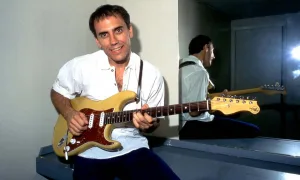 Ron Carter (Miles Davis Quintet -double bass) told me: “The first take in the studio is always the best, because the first time you play the music, the second time you play yourself”. Do you agree with this?
Ron Carter (Miles Davis Quintet -double bass) told me: “The first take in the studio is always the best, because the first time you play the music, the second time you play yourself”. Do you agree with this?
Often the first take can be and usually is for great players the most natural instinct to the tune that you are playing to. After that, you may get some good things but that first one often is the real you relating to the tune.
Could you describe to us the amazing chemistry you had with Jeff Porcaro (Toto, Steely Dan -drums)?
Yeah, it was a funny story. In about 1977, I was cutting way back my studio work because I was burned out doing 3 sessions a day, every day, 6 days a week, so, I decided to take a break because I was a player. In my teenage years, I played at night clubs, pop and jazz music. So, I just decided to cut my studio work way back and start playing at a jazz club in North Hollywood called Donte’s. Well, I had called John Guerin (Frank Sinatra, The Beach Boys), the great drummer, with Tom Scott (ed: Steely Dan, George Harrison -saxophone) we did all the Joni Mitchell records together, so, I had to call John to play drums, but he called me the night before the gig and said: “I’m stuck in Dallas. I can’t make it but call this young kid named Jeff Porcaro”. So, I called Jeff and he was only about 19 years old and at the club it was me, Joe Sample (keyboards) and Pops Popwell (bass) from The Crusaders and Jeff came in and he was so musical, so comfortable, not intimidated at all at 19 or 20 years old, whatever it was, and so special that was undeniable. And after that, I never called John again (laughs), I always called Jeff. Yeah, he was so special.
Had you ever been mistaken for Larry Coryell?
I’m sure you ‘ve heard that story. There was one time that a radio announcer, he was the host at a live concert, and I was on the bill and Larry Coryell was in the bill, and that was funny, the announcer was talking to the audience: “Alright, next guest coming up to play”, he listed all my credits and everything and said “Please welcome Larry Coryell!” (laughs) and I walked out on stage and I just smiled with him and he said: “I’m so sorry, man. Please welcome Larry Carlton”. It was great, it was great!
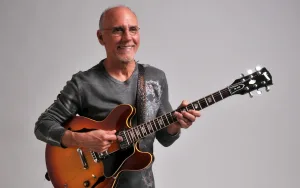 Larry Coryell told me that he did an interview with Stevie Ray Vaughan for Musician magazine in 1989 and suddenly realized that Stevie thought he was talking to you, Larry Carlton instead.
Larry Coryell told me that he did an interview with Stevie Ray Vaughan for Musician magazine in 1989 and suddenly realized that Stevie thought he was talking to you, Larry Carlton instead.
(Laughs) I have heard that story. It happens, you know. It happens.
Tony Williams (drums) came out from Boston and joined Miles Davis when he was 17 years old. Are there those kinds of opportunities today?
I don’t know, I will be very honest with you. My involvement in music, by choice, is just not really much, anymore. I had my day, I had 45 years of doing it in the thick of the music industry and you know, I’m 76 years old right now. Yeah, I don’t pay attention to those things. I’m living my life, like I said, I play the guitar 20-25 days in concerts a year and enjoy every minute of it, but I don’t know. I don’t know.
What are your thoughts now about the period you played in Fourplay?
It was a great time 12 years with Fourplay. Obviously, they totally changed their sound when I joined the band and I always appreciated the fact that the guys let me be me as a player, rather than try to imitate their sound before I joined the band. Harvey Mason (drums), Nathan East (bass) and Bob James (keyboards), all of course world class musicians, three on the nicest gentlemen you would ever want to meet and that’s what really made it special: The music was high-high quality but to hang with those kinds of guys was so special. I’m thankful for my time with Fourplay.
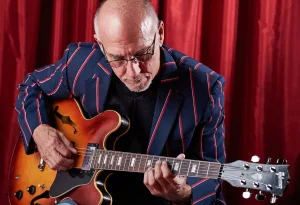 Do you think because of the streaming services listening to an album from start to finish is now becoming a kind of lost art?
Do you think because of the streaming services listening to an album from start to finish is now becoming a kind of lost art?
Yeah, for sure. Kids can go quick now, find a little tune they like and listen to that and maybe try another tune or two. I have granddaughters that are 22 and 20 years old and the 20-year old has been in love with Harry Styles and his music for a few years now and she listens to whole album, for sure. So, I don’t know about other kids and I think it’s less and less that the people are listening to the entire album now, but I don’t know for sure.
Would you like to tell us a few words about Jeff Beck, who passed away two years ago?
Yeah. Marvelous, marvelous, marvelous player, of course and I only met him once at the North Sea Jazz Festival. We had a chance encounter checking in at the hotel to shake hands and say “hello”, but from what I’ve heard he was also a gentleman. Very humble, but his approach to the guitar was so natural to him that no one else had ever thought about. So, yeah, Jeff, special-special-special.
Who is the person you had the best interaction on stage with?
Oh, there wouldn’t be just one person, for sure. I would say in the ‘80s the keyboard player that worked with me for many-many years, Terry Trotter (Frank Sinatra, Ella Fitzgerald). He was more of a Bill Evans jazz approach, so, he influenced me because every note I played: “Boo Doo Doo BAAAA”, he knew what that was and he would make that note sound so special because of his ears and his musicality. Those years with Terry really influenced me on playing with guys that are that high quality as musicians and of course, then Abraham Laboriel, Jeff Porcaro, all these guys that I had the chance to make music with. Kirk Whalum (Whitney Houston, Quincy Jones), oh my God! Saxophonist Kirk Whalum would rip your heart out. First time I heard him on the radio, I started looking to see who he was and I had to make phone calls to radio stations, to other people and I tracked him down, because I wanted to make music with him.
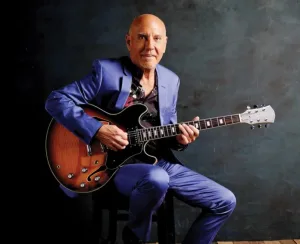 I did an interview in 2023 with Jorma Kaukonen (guitar) from Jefferson Airplane and he told me that as you are getting older you find yourself following more rules in songwriting because you know more about music. Do you agree with this?
I did an interview in 2023 with Jorma Kaukonen (guitar) from Jefferson Airplane and he told me that as you are getting older you find yourself following more rules in songwriting because you know more about music. Do you agree with this?
I’ve never thought of this as rules, but I can say as I’m getting older (laughs) and more mature is, as I listen to one of my heroes Joe Pass in his last decade or so of playing, he didn’t try to be anything except who he was. It was Joe playing Joe’s vocabulary, no matter where he was, he wasn’t trying to reinvent the wheel, he played the greatest bebop guitar solos that I have ever heard and I kind of look at myself like that. I’m just gonna play who I am at this stage of my career and not give much thought to it and I don’t feel that I have really anything to try to prove and I never did try to prove anything. So, when I pick up the guitar I just try to enjoy the music and see what it comes out.
Are there any plans for a new studio album?
No. No reason to. The only thing available is smooth jazz for radio, that doesn’t interest me and Spotify. I mean, people have heard everything that they are gonna hear from Larry Carlton, it’s all been captured and if they wanna hear more, they ‘ll come to the concert and watch me do it live, but no, I can’t see any reason to do another studio album.
Are you optimistic about the future of jazz?
I don’t know. I’ve never thought about it.
Are there any younger players that you can pass the torch to?
I don’t know if I would pass the torch but obviously Matteo Mancuso is marvelous-marvelous young player and I ‘m interested to see how he develops over the next 10 years with all the technique and the musicality that he has. I’m interested to see where that settles, because he is young, he should be going for it and he is going for it and he is marvelous. So, yeah, Matteo is somebody who has surfaced over the last 5 years or so, that I thought: “Ok, this kid is special. Let’s see how much music is gonna make in his career”.
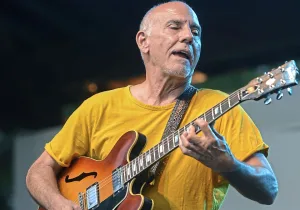 Do you remember any story about Quincy Jones (Michael Jackson, George Benson producer), who passed away recently?
Do you remember any story about Quincy Jones (Michael Jackson, George Benson producer), who passed away recently?
Yeah, the first time, this would be in 1969, so I would have been 22 years old, just breaking in into the studios and I got a call to do a TV date at a big soundstage. I got there and there was Quincy Jones and about nine musicians with this screen, the dark room, music stands and it was my first session for Quincy. I read the first guitar part, we got the take, but then what he did and I never forgot this because I was intimidated, I was so young, he started re-orchestrating on the spot: “Ok, guitar, take the flute part. Flute, take the sax part”. He was re-orchestrating the sounds of the same cue and I was on edge; all of a sudden, to be able to read that music that quick in that environment. It was for the Bill Cosby show “Fat Albert” and I never forgot that, I realized that was big time: To be able to pass the music around in the studio and then play it immediately. That was my first experience with Quincy and what a gentleman he was.
Did you like players on other instruments like Chick Corea (Return to Forever, Miles Davis -keyboards)?
Of course, Chick was marvelous. I always listened more to Herbie Hancock (ed: Miles Davis -keyboards) than I did to Chick, personal preference.
Bass players like Jaco Pastorius?
Of course (laughs). Who could deny Jaco walking into a room and making that much music with a unique approach to it. Yeah, a couple of the albums that Jaco and I did for Joni Mitchell are highlights for me of getting to interact with Jaco, musically.
A huge “THANK YOU” to Mr. Larry Carlton for his time. I should also thank Mr. Robert Williams for his valuable help.
Official Larry Carlton website: https://www.larrycarlton335.com/
Official Larry Carlton Facebook page: https://www.facebook.com/LarryCarlton335/
Sire Larry Carlton signature guitars: https://sire-usa.com/collections/larry-carlton

